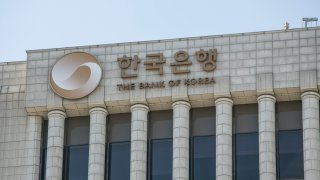
- The Bank of Korea said Wednesday that it would boost short-term liquidity and deploy measures to stabilize the FX market as needed, after South Korean President Yoon Suk Yeol lifted a surprise martial law declaration overnight.
- The announcement came shortly after the BOK held an emergency board meeting, which started around 9 a.m. local time.
- In a statement issued after the meeting, the central bank said it will also make any special loans available to inject funds into the market, if needed.
The Bank of Korea said Wednesday that it would boost short-term liquidity and deploy measures to stabilize the FX market as needed, after South Korean President Yoon Suk Yeol lifted a surprise martial law declaration overnight.
WATCH ANYTIME FOR FREE
>Stream NBC10 Boston news for free, 24/7, wherever you are. |
The announcement came shortly after the BOK held an emergency board meeting, which started around 9 a.m. local time. In a statement issued after the meeting, the central bank said it will also make any special loans available to inject funds into the market, if needed.
"As announced together with the government, we will provide sufficient liquidity for a limited time until the financial and foreign exchange markets stabilize," the Bank of Korea said, reiterating a pledge made earlier in the day by South Korea Finance Minister Choi Sang-mok.
Get updates on what's happening in Boston to your inbox. Sign up for our >News Headlines newsletter.
Local news agency Yonhap reported earlier Wednesday that South Korea's financial regulator said it is prepared to allocate 10 trillion won ($7.07 billion) to a stock market stabilization fund at any time.
Yoon declared an emergency martial law and mobilized the army late Tuesday night. Within hours, the National Assembly voted to overturn the emergency order, forcing Yoon to lift martial law early Wednesday morning. The military units that were deployed have also been withdrawn, Yoon announced at the time.
Money Report
"In our view, the negative impact to the economy and financial market could be short-lived as uncertainties on [the] political and economic environment could be quickly mitigated on the back of proactive policy response," Citi analysts said in a note.
South Korean stocks experienced significant fluctuations in the U.S. on Tuesday amid political turmoil in Korea. The iShares MSCI South Korea ETF (EWY), which tracks more than 90 large and mid-sized companies in South Korea, tumbled as much as 7% to hit a 52-week low before cutting losses to close 1.6% lower.
Last week, the BOK cut its benchmark interest rate by 25 basis points in a surprise move.
South Korea's stock markets started trading at the usual 9 a.m. KST.






